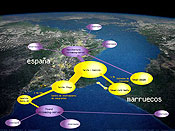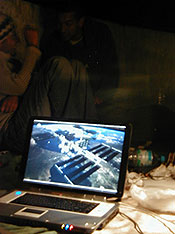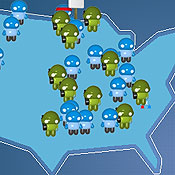:: Wednesday, July 27, 2005 ::
ART AND GLOBALIZATION::Weekly Features::
special focus
fada'iat_2004/2005 through spaces of Fortress EU's southwest border
by Molly Hankwitz
fada'iat means 'through spaces' in Arabic  The project assembled at the border of Tangiers and Tarifa between two points of land across the Straits of Gibraltar has utilized media-architecture devices of "satellite antenna, wi-fi link across the Straits, movable units"...[and] "worked like a luminous mirror - reverse engineering of the SIVE - the Surveillance System of the Straits" --hackitecture website
The project assembled at the border of Tangiers and Tarifa between two points of land across the Straits of Gibraltar has utilized media-architecture devices of "satellite antenna, wi-fi link across the Straits, movable units"...[and] "worked like a luminous mirror - reverse engineering of the SIVE - the Surveillance System of the Straits" --hackitecture website
A set of bold moves for the 'no borders' techn- camps and "temporary consensus zones"(1) for tactical media and hacktivism. fada'iat is a geospatial 'virtual bridge' escapade. The politics of the networks uses low-tech tools to pierce through the assumptive hi-tech curtain of the nationalistic EU border-culture. Such temporary lab collaborations have all the ear marks of the collective net.activism European digital artists have offered as gestures of solidarity to their neighbours. One is reminded of the superb re-routing of the 'B92' radio station in Belgrade by Dutch networks during the Boznian 'crisis'when the lunky Serbian army tried to censor independent journalism in the Czech Republic by storming the station's physical office space to 'shut them down.' Its amazing how military power knows that telecommunications need to be severed to protect their wars, but understand so little about digital networks.
fada'iat is a blast of technopolitical energy poking holes in the single-minded "command and control" surveillance culture of the global telecommunications-military-industrial-entertainment nexus.  fada'iat attempts to reclaim the 'local geography' of Straits of Gibraltar on their own telecommunications terms; literally, to take the place and its history back; to defy the surveillance of the region. They have done, what media theorist Nick Couldry might say is 'relocating the centre of alternative media' (2) but even beyond that, one particularly attractive thing about the whole 'no borders' trope is the willingness on the part of the participants to be politically and technoculturally 'messy.' And how amazing is it that they set up new networks, "other" networks, across 'no zones'?
fada'iat attempts to reclaim the 'local geography' of Straits of Gibraltar on their own telecommunications terms; literally, to take the place and its history back; to defy the surveillance of the region. They have done, what media theorist Nick Couldry might say is 'relocating the centre of alternative media' (2) but even beyond that, one particularly attractive thing about the whole 'no borders' trope is the willingness on the part of the participants to be politically and technoculturally 'messy.' And how amazing is it that they set up new networks, "other" networks, across 'no zones'?
New spaces for the freedom of knowledge, like the 'virtual bridge', can destroy the colonizing power of the technologicalized 'war on terror' and its SIVE-like manifestations. They offer space to breathe and speak for the imagination of a very different future.
--
For a history of fada'iat 2004/2005, check the site
Notes:
--
(1) Lovink, Geert. 2002. Dark Fibre. Cambridge: MIT, 2002. p. 217
(2) Couldry, Nick. 2002. 'Mediation and Alternative Media, or Relocating the Centre of Media and Communications Studies' Media International Australia incorporating Culture and Policy, no. 103, May, pp. 24-51.
ART AND GLOBALIZATION
::Weekly Features::
special focus
Project.Review: Antiwargame, boredom as commentary
by Eduardo Navas
 Games are usually related with entertainment. There are plenty of artworks outthere, however, that appropriate the codes of videogames to create social commentary. This is the case with antiwargame, a futurefarmers project that reflects upon the current state of affairs in the middle east.
Games are usually related with entertainment. There are plenty of artworks outthere, however, that appropriate the codes of videogames to create social commentary. This is the case with antiwargame, a futurefarmers project that reflects upon the current state of affairs in the middle east.The game offers a choice between two avatars, Uncle Sam or Aunt Samantha, whichever you choose will become President. The point of the game is to keep budget spending moderate so that the President is not reprimanded by any one interest group for favoritism and can therefore stay in office. The Budget is divided into three sections, Military/Business, Social Spending, and Foreign Aid. The President needs to deal with a terrorist attack, which complicates matters even further.
The game is actually anti-climactic. The user will wonder just after a minute or two about its purpose because it is far from entertaining, and this is where the criticism lies. There are options to send some characters, who appear in a map of the United States, overseas as National Guard or Army, and when they get to the middle east to secure the oil wells, they sit around making boring commentaries. While this commentary on soldiers is problematic and must be questioned because U.S. soldiers are actually risking their lives in the middle east, the online videogame is quite explicit in its position regarding the war. Having to keep a budget balanced that includes foreign aid alludes to the United States' influence in the global market, and the economic repercussions of the war become implicit. If anything the user has to reflect upon the problematics and many complexities that have developed since the United States entered Irak two years ago. And room for reflection is the least we can ask for especially during tough times.